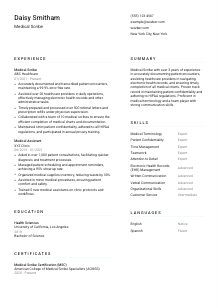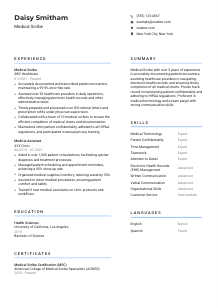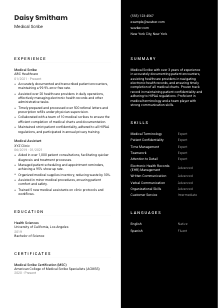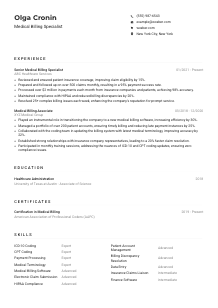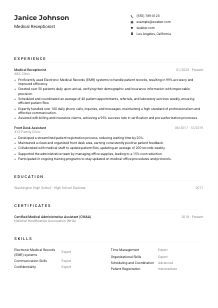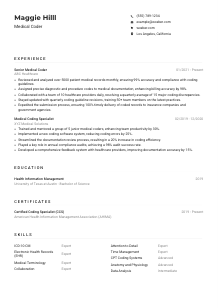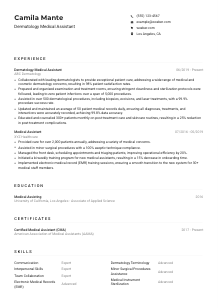Medical Scribe Resume Example
Charting patients, but your resume feels like a prescription nobody can read? Dive into this Medical Scribe resume example, transcribed using Wozber free resume builder. Learn how to elucidate your clinical clerkship with job expectations, crafting a resume as clear and concise as the records you generate!
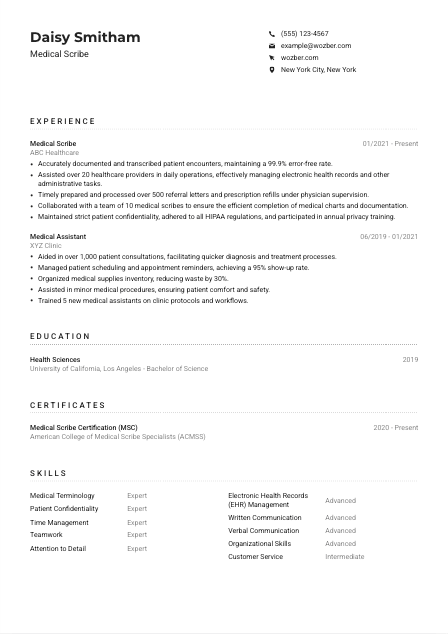
How to write a Medical Scribe resume?
Hello, aspiring Medical Scribe! As you venture into the evolving healthcare landscape, your resume is your gateway to remarkable opportunities. It's more than a document; it's a beacon highlighting your precision, dedication, and passion. Here, we'll guide you step-by-step to create a resume that resonates with the heart of the medical scribing profession, leveraging Wozber's free resume builder, ATS-compliant resume formats, and expert ATS optimization techniques.
Personal Details
The Personal Details section is your resume's handshake. It's where you make your first impression, assuring it's both impactful and aligned with your aspiration to becoming a Medical Scribe.
1. Your Name, Your Banner
Let your name be prominent, using a clear, professional font. It's the flag under which all your achievements sail.
2. Job Title Alignment
Echo the role you're eyeing. Placing "Medical Scribe" directly under your name tunes the hiring manager's attention to your target role, establishing relevance right off the bat.
3. Contact Information Essentials
Ensure your phone number and a professional email address are typo-free. A simple firstname.lastname@email.com format is elegant and effective.
4. Location Matters
The job description mentions "Must be located in New York City, New York." Highlighting this in your contact details saves the hiring team time and aligns with their prerequisites.
5. Professional Presence
Linking a LinkedIn profile or personal website demonstrates your commitment to your career. Make certain they are pristine and mirror the achievements and professionalism of your resume.
Takeaway
Think of the Personal Details as your resume's compass, guiding hiring managers towards your suitability for the Medical Scribe position. It sets the tone, inviting them to learn more about your qualifications.





Experience
Your journey through clinical and medical settings is a story of growth and dedication. Let's dissect how to illustrate this journey with precision, ensuring each experience resonates with the role of a Medical Scribe.
- Accurately documented and transcribed patient encounters, maintaining a 99.9% error‑free rate.
- Assisted over 20 healthcare providers in daily operations, effectively managing electronic health records and other administrative tasks.
- Timely prepared and processed over 500 referral letters and prescription refills under physician supervision.
- Collaborated with a team of 10 medical scribes to ensure the efficient completion of medical charts and documentation.
- Maintained strict patient confidentiality, adhered to all HIPAA regulations, and participated in annual privacy training.
- Aided in over 1,000 patient consultations, facilitating quicker diagnosis and treatment processes.
- Managed patient scheduling and appointment reminders, achieving a 95% show‑up rate.
- Organized medical supplies inventory, reducing waste by 30%.
- Assisted in minor medical procedures, ensuring patient comfort and safety.
- Trained 5 new medical assistants on clinic protocols and workflows.
1. Job Description Breakdown
Start by dissecting the job description. Look for phrases like "Accurately and thoroughly document patient encounters" and "Assist healthcare providers," aligning them with your own experiences.
2. The Framework of Your Journey
Structure your experiences in reverse chronological order. Begin each entry with your role, employer, and the dates of your tenure, creating a clear timeline of your growth and responsibilities.
3. Echoing Accomplishments
For each role, mention accomplishments that mirror the job's demands. If you "Accurately documented and transcribed patient encounters," including statistics like a "99.9% error‑free rate" highlights both precision and volume.
4. Quantifying Impact
Whenever feasible, quantify your contributions. Managing "over 500 referral letters and prescription refills" is far more impactful than "managed referrals and prescriptions," offering tangible proof of your capability.
5. Relevant Experiences Only
Prioritize experiences that showcase your adeptness at medical transcription, EHR navigation, and patient confidentiality adherence. Every experience listed should bring you closer to the Medical Scribe role.
Takeaway
A well-crafted Experience section is your evidence of capability and dedication. Employ precision in your presentation, and let your professional journey advocate your proficiency and enthusiasm for the Medical Scribe role.
Education
In the healthcare sector, your educational background lays the foundation of your expertise. Let's tailor this section to emphasize your preparedness and commitment to the Medical Scribe profession.
1. Key Educational Qualifications
Highlight a Bachelor's degree in a relevant healthcare field, like "Bachelor of Science in Health Sciences," directly meeting the job's fundamental requirement.
2. Structure Made Simple
Maintain clarity with a straightforward listing of your degree, the field of study, institution, and the year of completion. This approach keeps the focus on your qualifications.
3. Degree Specifics
Ensure the degree specified matches job prerequisites directly. This direct correlation strengthens the conviction in your application, showing you're not just qualified but well-prepared.
4. Relevant Courses and Projects
While the broader degree communicates your qualification, mentioning courses or projects related to medical documentation or terminology can sharpen your resume's focus towards the Medical Scribe role.
5. Additional Educational Achievements
If you have certifications, honors, or extracurricular involvements that reinforce your commitment to healthcare, include them. They add depth, showing a multifaceted appreciation and understanding of the field.
Takeaway
Your education goes beyond mere credentials; it reflects your journey into healthcare, laying a knowledgeable foundation for your aspirations as a Medical Scribe. Highlight it with the respect and attention it deserves.
Certificates
In a field where precision matters, certifications not only underscore your knowledge but also your dedication to staying at the forefront. Let's ensure your certifications align perfectly with your Medical Scribe aspirations.
1. Job-Centric Certifications
Identify certifications listed in the job posting, such as "Certification as a Medical Scribe (MSC or equivalent) is preferred." Highlighting this certification places you a step ahead.
2. Quality Over Quantity
It's tempting to list every certificate you've earned. However, focusing on those specifically relevant to the Medical Scribe role, like the MSC, ensures your resume is targeted and potent.
3. Date Specifics
Adding the acquisition year of your certification, especially if recent, can emphasize your updated expertise and ongoing commitment to professional development.
4. Lifelong Learning
The healthcare field evolves; so should you. Emphasize your commitment to continuous learning by pursuing and listing new certifications relevant to your career path as a Medical Scribe.
Takeaway
Each certification on your resume is a testament to your expertise and commitment. Make them count. Tailor this section to highlight your readiness and eagerness to excel as a Medical Scribe.
Skills
Your skills section is a curated display of your professional capabilities. Here, we'll align your skills not just with the Medical Scribe role but with the nuanced expectations of the healthcare industry.
1. Decode and Match
Analyze the job description for both explicit and implicitly valued skills. Matching skills such as "Medical Terminology" and "EHR Management" with your own showcases your comprehensive toolkit.
2. Prioritize and List
Focus on the skills most pertinent to a Medical Scribe, like "Attention to Detail" and "Patient Confidentiality," ensuring your skill set aligns directly with job expectations.
3. Skills Organization
Organize your skills logically, starting with those most critical to the Medical Scribe role. This approach not only emphasizes your fit but also your understanding of the role's priorities.
Takeaway
Your skillset is your arsenal in the highly meticulous field of medical scribing. Curate it deliberately, ensuring it communicates your proficiency, passion, and preparedness for challenges ahead.
Languages
In a role where comprehension and communication are paramount, showcasing your linguistic abilities can be an added advantage. Let's position your language skills as a distinctive asset for the Medical Scribe position.
1. Job Language Prerequisites
The job explicitly requires proficiency in English for professional interactions. Highlighting your native or fluent command in English directly meets this essential criterion.
2. Additional Language Proficiencies
While the focus is on English, listing other languages you are fluent in, like Spanish, demonstrates your broader communication abilities and potential to interact with a diverse patient base.
3. Proficiency Levels
Be explicit about your language proficiency levels, using clear categorizations like native, fluent, or intermediate. This clarity helps set realistic expectations for your linguistic capabilities.
4. Role Versatility
Even if not specified, additional languages can bolster your resume, suggesting versatility and potential for broader communication, especially in diverse settings typical of New York City.
5. Language and Global Scope
In healthcare's global landscape, each language you speak is not just a skill but a bridge to understanding and connecting with more patients. View and present it as a valuable asset.
Takeaway
Embrace and showcase your language skills not as mere proficiencies but as tools for better understanding, empathy, and care. In the world of healthcare, every language you speak adds depth to your role as a Medical Scribe.
Summary
Your summary is the narrative heart of your resume, encapsulating your aspirations, experiences, and the core value you bring to the Medical Scribe role. Let's sculpt it with the precision it deserves.
1. Essence of the Role
Begin by internalizing the essence of the Medical Scribe position, focusing on core responsibilities like "Accurately documenting patient encounters" and "navigating electronic health records."
2. Introduce Your Professional Self
Kickstart your summary with a vivid statement about your journey in the healthcare field, setting the stage for a narrative that emphasizes both your expertise and your dedication.
3. Mirror Job Expectations
Highlight your mastery in skills directly related to the role, such as "Proficient in medical terminology" and your stellar adherence to "patient confidentiality," underscoring your alignment with the role's demands.
4. The Art of Brevity
Craft your summary to be concise yet impactful. In 3-5 lines, encapsulate your experience, skills, and the unique value you offer, making every word count towards a gripping introduction.
Takeaway
Your Professional Summary is the prologue to your story, enticing hiring managers to delve deeper into your resume. Craft it with care, precision, and a touch of narrative flair, setting the stage for a resume that stands out in your journey to becoming a masterful Medical Scribe.
Launching Your Medical Scribe Journey with Wozber
Congratulations on taking this detailed journey through tailoring a standout resume. With these insights, backed by Wozber's free resume builder, ATS-friendly resume templates, and ATS optimization tools, you're equipped to create a resume that resonates with the essence of a Medical Scribe. Your career in healthcare is a journey of continuous learning and profound impact. Let your resume be the tool that opens doors to opportunities where you can make a significant difference.
The future awaits your unique talents. Begin now, and let your journey as a Medical Scribe unfold!

- Bachelor's degree in a relevant healthcare field or currently pursuing a degree in a healthcare-related program.
- Minimum of 1 year experience in a clinical or medical setting.
- Proficiency in medical terminology and ability to accurately transcribe patient information.
- Strong communication skills, both written and verbal.
- Certification as a Medical Scribe (MSC or equivalent) is preferred.
- Must be capable in English for professional interactions.
- Must be located in New York City, New York.
- Accurately and thoroughly document patient encounters and medical histories in real-time.
- Assist healthcare providers in navigating electronic health records and manage documents and test results as needed.
- Prepare referral letters, prescription refills, and manage patient communications under physician supervision.
- Ensure timely and accurate completion of all medical charts and administrative documentation.
- Maintain patient confidentiality and adhere to all HIPAA regulations.





